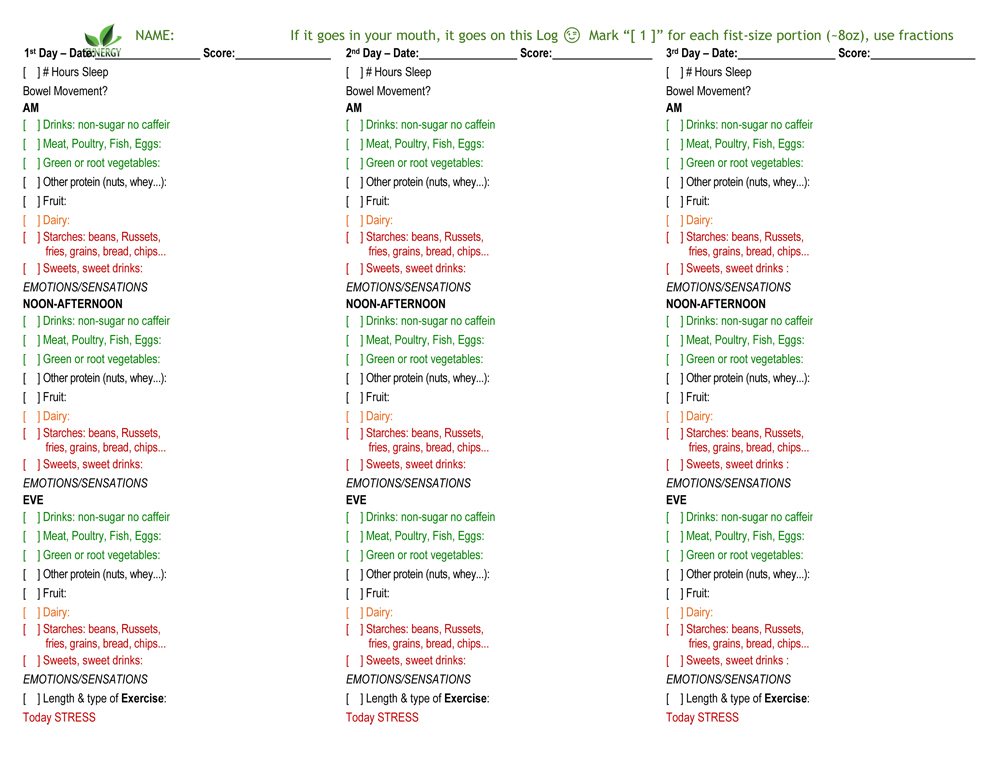Balance your blood sugar
Are you sugar addicted? Take this quiz:
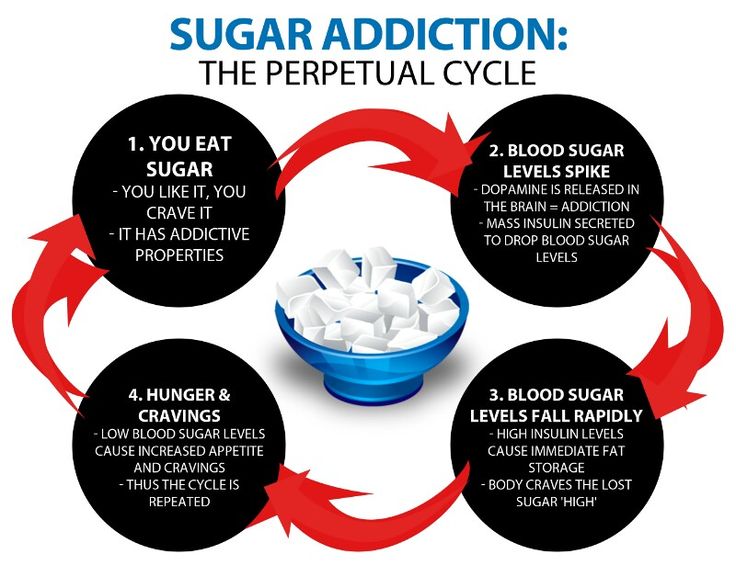
| 1. I don’t eat refined sugar every day. | True | False |
| 2. I can go more than a day without eating some kind of sugar-containing food. | True | False |
| 3. I never have cravings for sugar, coffee, chocolate, peanut butter or alcohol. | True | False |
| 4. I’ve never hidden sweets around the house so I can eat them later. | True | False |
| 5. I can stop after eating one bite of pastry or one piece of candy. | True | False |
| 6. There are times when I have no sugar around the house. | True | False |
| 7. I can have sweets in the house without eating them. | True | False |
| 8. I can go at least 3 hours without eating without shakes, fatigue or bad moods. | True | False |
| 9. I do not eat something sweet after every meal. | True | False |
| 10. I rarely drink coffee or eat donuts or sweet rolls for breakfast. | True | False |
| 11. I can go more than an hour after waking without eating. | True | False |
| 12. I don’t drink sweetened soft drinks every day. | True | False |
If you answered “false” to four or more statements, chances are your body can’t tolerate sugar yet your are addicted to it. I’m sorry to say this, it’s similar to how an alcoholic is addicted to alcohol. Really.
Crave sugar? That’s a withdrawal symptom. Feel moody or anxious 2 hours after eating and then feel better after a coffee, cookies or starchy snack? Sugar alters brain neurochemistry similarly to drugs of abuse. Sugar causes “self-medicating” behavior patterns.
But, by eating sugar to feel better, you are actually making you condition worse. Pay careful attention to this lesson.
Also pay careful attention to this: Many people don’t realize where all their sugar is coming from. If you answered “false” to four statements or fewer, make sure you read every ingredients list. You might be surprised.
Take out your Food & Mood log from last week.
Grab a pen and circle everything that contains sugar and/or is converted to sugar in the body. What’s converted to sugar? For now, start with everything that’s in the “red zone” of your log: grains, breads, crackers… most store-bought condiments, and also dairy.
Don’t worry about starchy vegetables for now; they have a place on our plates.
Do include “breakfast bars” “protein bars” most “smoothies” store-bought “protein drinks”…
Don’t worry about berries, apples, peaches… but carefully scrutinize tropical fruits like banana’s, pineapple, mangos, oranges… these are very high in sweet.
How many circles do you have each day? Keep that in mind as you read on… and please remember: Knowledge is Power. This is the start of awareness; work on reducing.
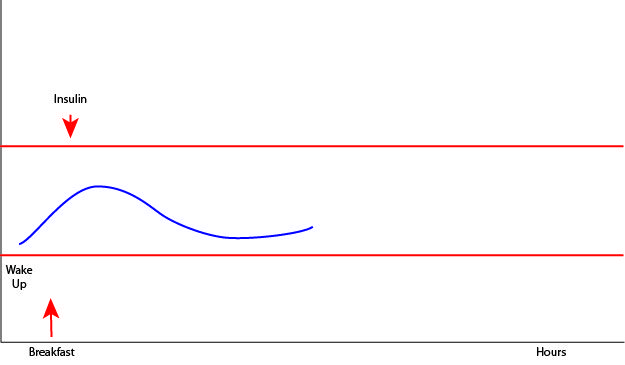
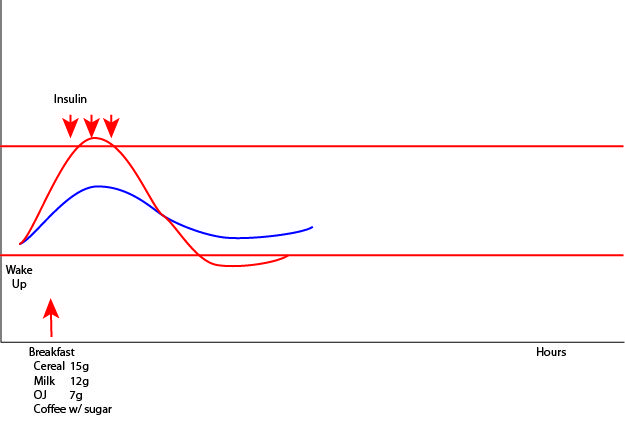
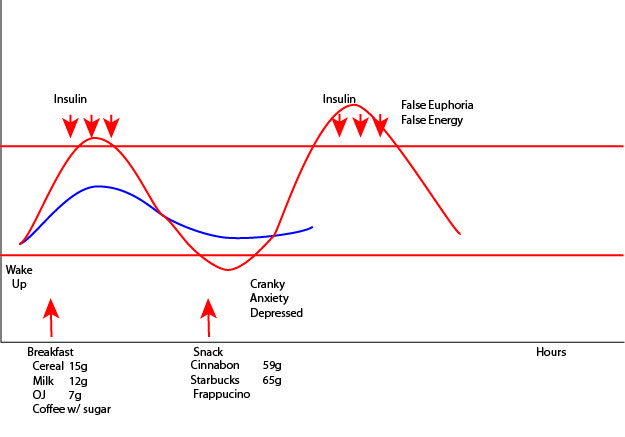
The blood sugar rollercoaster
As with all systems in the body, the amount of sugar in your blood should stay in a certain range. Today we’re talking about how your body handles sugar. Blood sugar cycles throughout your day between low when you wake up (our liver drip feeds a small amount of glucose as we sleep to make sure blood sugar doesn’t go too low) and goes up after a meal depending on what you eat—if you are healthy your body keeps blood sugar carefully controlled within this range.
If the system looks like it’s going to shift outside this healthy range, the body immediately exerts effort to bring it back in range: Too high can put you in a coma or even kill you, too low can also put you in a coma or cause seizures. But if you treat yourself well, your blood sugar stays within a healthy range controlled by your body.
That breakfast of cereal, milk, OJ, sweetened coffee… strawberry garnish… if you ate the serving size, that’s 35-50 grams of sugar. A cereal serving size is 1/2 cup.
Problem: Your blood sugar rises really fast—so fast that the body has to take emergency steps. Although you don’t feel a thing:
- The pancreas makes extra insulin—3x the insulin, or more—to push the Frappuccino double mocha or cola sugar out of the blood
- The sugar is quickly forced out of the blood and into your cells
- Except, that makes the blood sugar drop too low
- In a few hours we’re hungry again, tired, cranky, depressed, anxious (this is very primal)
Under stress, our body worries about the low blood sugar by having YOU feel emotional = anxiety (must fix blood sugar) = dispersal (must handle now!) = cranky (nothing else matters)… All of your attention goes on solving this catastrophe. It’s impossible to focus on any task at hand, work… this is often why our children won’t study much less listen to their teacher…
Soooo around 10AM we run out and grab a cinnabon or mocha frappucino or… maybe we’re trying to be healthy so we grab a granola bar or Larabar… 30-60 grams of sugar later, we’ve averted blood sugar disaster. Our blood sugar is back on the rise, we’re “saved”.
Until we do this again…With that sort of meal
Have you ever asked where the blood sugar goes?
Pause
Think about it
It has to go somewhere
Here's how sugar makes you fat
Insulin opens little doors, if you will, on all your cells. Sugar moves out of the blood stream and enters every cell in your body.
Now what happens? Have you ever run on a treadmill or stairmaster? How many calories can you burn in an hour workout?”
About 300. Yet there are 600 or more calories in the typical meal.
What does the cell does with the energy it doesn’t use?
It converts extra calories to FAT. What your cells can’t use is converted to triglycerides, a form of fat, and sent back into the blood to be stored. Most of it is sent to be stored in the fat around your waist & hips. Your blood tests eventually will show high triglycerides:
- liver congestion (non-alcoholic fatty liver disease)
- heart disease
- hormonal changes
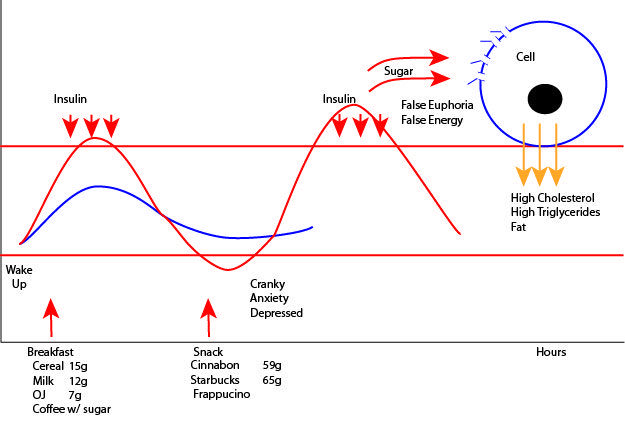
And that's not all...
Too many carbohydrates and sugars (anti-foods) cause blood fat and blood cholesterol imbalances.
If you ever wanted to lose weight, know this: Insulin prevents your body from burning fat. It forces your body to use the sugar and carbs you are eating for energy and forces your body to store any fat from your meal. The absolute best way to get and stay fat is to raise your blood sugar and ALSO eat some fat. Any and all of the fat will go right to your waist, hips, thighs…because your body has to get rid of the excess sugar.
FAT DOES NOT MAKE YOU FAT, SUGAR AND STARCHY FOODS THAT RAISE YOUR BLOOD SUGAR MAKE YOU FAT. EATING TOO MUCH OF ANYTHING, OF COURSE, ALSO MAKES YOU FAT
We don’t want to be overweight. We’ve been lied to: We eat over 150 pounds of added sugar every year. Most of this has very little nutritional value. We “treat” ourselves to high blood sugar and high triglycerides, tell our body we are in a period of abundance and to store excesses as fat. It isn’t about calories, it’s about whether or not the foods we choose contribute nutrients or empty, fattening, calories.
Diabetes? Sugar is toxic
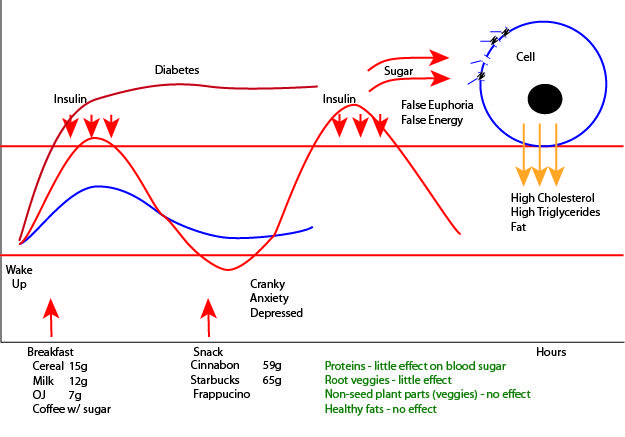
Cells protect themselves from too much sugar by shutting their ‘doors’ to more sugar. This is called insulin resistance.
When someone develops “insulin resistance” and then eats their 40+ grams of sugar cereal, milk, and OJ breakfast their blood sugar goes very high and their own insulin isn’t enough to push it into their cells.
Only carbohydrate foods (starches and sugars) can cause this problem. That includes your grains and of course anything very sweet.
Non-starchy foods like green veggies and even many root vegetables—parts of the plant that are not the starchy seeds—have little effect on blood sugar and provide most of your vitamins.
Fats and most green vegetables have no effect on blood sugar. Proteins are digested in a way that can elevate blood sugar very slightly. Fruits, seeds/grains/nuts and certain root vegetables store a lot of sugar and starches. Too much of any of these can create sugar imbalances.
Let's put it all together
Week 1: Calming inflammation
Week 2: Planning your meals
Week 3: Get digestion happening
And… Controlling blood sugar and cravings
Send me your weekly food and mood log—there is hope and I can help.

